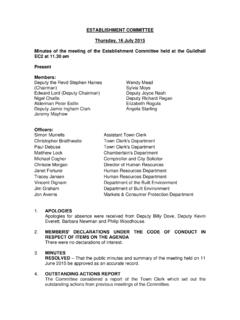Transcription of COL Letter to:
1 Approved by the Court of Common Council on XX. Guidance to Members Members Code of Conduct General 1. This Guidance is supplemental to the City of London Corporation s Code of Conduct for Members ( the Code ). As in the Code, any reference to a Member includes both a member of the Corporation and a member of a committee of the Corporation. 2. It is not possible to cover every scenario or eventuality in this Guidance, which is intended as an aid for Members. It is not meant to be construed in an overly forensic or legalistic fashion.
2 Rather, Members should consider how their actions might be perceived by the general public. In interpreting this Guidance and the Code, Members should at all times have regard to the Seven Principles of Public Life selflessness; integrity; objectivity; accountability; openness; honesty; and leadership. Further advice on the requirements of the Code can be obtained from the Corporation s Monitoring Officer (the Comptroller & City Solicitor) or the Committee and Member Services Team.
3 Register of Member Interests 3. All information provided on a Member Declaration Form will be published and made available for inspection the only exception is where specific information is deemed to be sensitive, as set out in the Code. 4. A Member s register of interests will be published via the respective Member s page on the Corporation s website. The register includes sections on disclosable pecuniary interests, non-pecuniary interests and gifts and hospitality. 5. The Code sets out the relevant timescales for registering interests.
4 One requirement is to notify the Monitoring Officer (via the Town Clerk) of any disclosable pecuniary interest, and specified non-pecuniary interests, within 28 days of taking office as a Member. Accordingly, a Member Declaration Form will be sent to Members following election or appointment. 6. Where a Member has been re-elected or re-appointed, the requirements of the Code are satisfied if the register is updated it is not necessary to register interests that have previously been notified to the Town Clerk.
5 7. The Code also states that a Member must maintain an up to date register of interests and Members are encouraged to regularly review their register entries. In addition, Members will be contacted individually once a year to review and where necessary APPENDIX 3 update their register of interests and will also be reminded of the arrangements in respect of requests for dispensations. 8. Where you wish to register any interest, please use the Declaration Form provided (where appropriate) or contact the Committee and Member Services Team via email at or telephone: 020 7332 1407 or 020 7332 1409.
6 Disclosable Pecuniary Interests 9. The Code requires Members to register their disclosable pecuniary interests, as defined by regulations made by the Secretary of State the current regulations are included in Appendix 1 of the Code. 10. It is essential that Members follow the rules on disclosable pecuniary interests because failure to do so may result in prosecution, a fine and/or disqualification as a member for up to 5 years. Investigations and sanctions regarding breaches of this aspect of the Code will be a matter for the Director of Public Prosecutions.
7 Declaring interests in Securities What are Securities? 11. For these purposes securities means shares, debentures, debenture stock, loan stock, bonds, units of a collective investment scheme within the meaning of the Financial Services and Markets Act 2000 and any other securities of any description other than money deposited with a building society (Regulation 1 of The Relevant Authorities (Disclosable Pecuniary Interests) Regulations 2012). What Securities must be registered?
8 12. Members must register any beneficial interest in securities where:- (a) The body, to the member s knowledge has a place of business or land within the City of London s area; and (b) either- (i) the total nominal value of the securities exceeds 25,000 or one hundredth of the total issued share capital of that body (whichever is the lower); or (ii) if the share capital of that body is of more than one class, the total nominal value of the shares in any one class in which the relevant person has a beneficial interest exceeds one hundredth of the total issued share capital of that class.
9 What is a beneficial interest ? 13. A beneficial interest arises where there is a right to the economic benefit of the securities a right to the income from the securities or a share of it and a right to the proceeds of sale or part of the proceeds. What degree of knowledge is required? 14. A Member will be taken to have knowledge of the necessary facts if:- They have actual knowledge; or They wilfully shut their eyes to the obvious; or They wilfully and recklessly fail to make such inquiries as an honest and reasonable man would make; or They have knowledge of circumstances which would indicate the facts to an honest or reasonable man; or They have knowledge of circumstances which would put an honest and reasonable man on enquiry.
10 Thus genuine and reasonable ignorance of the facts is required if the obligation to register a disclosable pecuniary interest is to be avoided. 15. There is no general obligation to undertake extensive enquiries and thus a Member with significant holdings in, say, a unit trust is unlikely to be required to ascertain the value of the beneficial interest in each company within the trust and whether they have a place of business in the City provided that this is not apparent from the material routinely supplied to unit trust holders.















